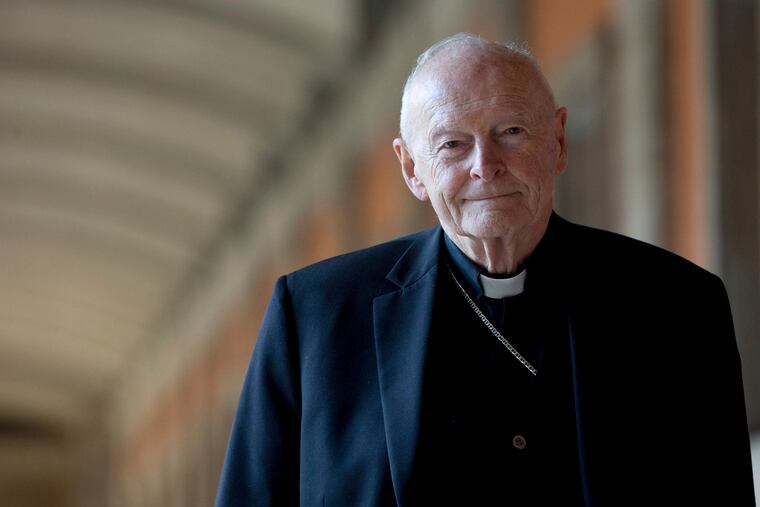Theodore McCarrick still won’t confess | Marc Thiessen
McCarrick's shocking interview should serve as a reminder that we cannot rest until every single priest who has abused a child has been exposed and removed.

Disgraced ex-Cardinal Theodore McCarrick was defrocked in February and ordered by Pope Francis to live a “life of prayer and penance.” It seems the message did not get through. McCarrick, it turns out, is unrepentant.
Slate reporter Ruth Graham recently visited the Capuchin friary in Victoria, Kan., where McCarrick is living in solitude. The former prince of the church gave her a short, but shocking, interview. Asked about the accusations that he had sexually assaulted minors and seminarians under his authority, McCarrick denied the charges. “I’m not as bad as they paint me,” he said. “I do not believe that I did the things that they accused me of.”
Believe? An innocent man would never say, “I do not believe I did it.” Asked if he was leaving open the possibility that he did in fact do the horrible things of which he has been accused, McCarrick said no. Everyone is lying. He is an innocent man.
McCarrick specifically denied the accusation that finally turned Pope Francis against him — that he had molested a young boy during the sacrament of confession. Never mind that McCarrick was expelled from the priesthood after a canonical trial found him guilty of “solicitation in the Sacrament of Confession, and sins against the Sixth Commandment with minors and with adults, with the aggravating factor of the abuse of power.” Never mind that he appealed that decision and lost. “The thing about the confession, it’s a horrible thing,” he said, “I was a priest for 60 years, and I would never have done anything like that. … That was horrible, to take the holy sacrament and to make it a sinful thing.”
Yes, it was horrible. So was sexually abusing two other minors and forcing young priests and seminarians to share your bed. It's all horrible. But no matter, McCarrick says they are making it all up. Asked why so many seminarians would come up with the same story, McCarrick said "I think that they were encouraged to do that" by unnamed "enemies."
He also lashed out at Archbishop Carlo Maria Viganò, the former papal nuncio to the United States, who revealed last year that he had personally informed Pope Francis about the serious allegations against McCarrick and named more than a dozen cardinals he said covered up McCarrick's abuses. "He was talking as a representative of the far right, I think," McCarrick said of Viganò. "I don't want to say he's a liar, but I think some of the bishops have said that he was not telling the truth."
Actually, Viganò was telling the truth. In May, Monsignor Anthony Figueiredo, a former McCarrick aide, released portions of McCarrick’s emails and private letters that confirmed many of Viganò’s charges. McCarrick’s own correspondence shows that senior Vatican officials, including the secretary of state, the head of the Congregation for Bishops, the papal nuncio to the United States, and Cardinal Donald Wuerl were all aware of the accusations against him. McCarrick also acknowledges the restrictions imposed on him in 2008, including that he not travel without express Vatican permission, resign from all roles at the Holy See and the United States Conference of Catholic Bishops, and not go to Rome. McCarrick later flouted those restrictions and became a close adviser to Pope Francis, which prompted Viganò’s warning to Francis that, at “the Congregation for Bishops there is a dossier this thick about him” — a warning Francis ignored.
Last September, Cardinal Daniel DiNardo, president of the U.S. Conference of Catholic Bishops, asked Francis to order a full investigation — called an “apostolic visitation” — into the McCarrick affair. His request was denied. But in October, Francis did order a review of documents already “in the Archives of the Dicasteries and Offices of the Holy See.” What’s taking so long? Both Viganò and Figueiredo cited specific letters and documents, including that thick dossier in the Congregation for Bishops. Nearly a year later, nothing has been released.
It is simply pathetic that almost everything we know about the McCarrick cover-up has come not from the church itself but from investigative journalists, grand juries and whistle-blowers. Even worse is the fact that his many enablers in the Catholic hierarchy have still not been held to account. And McCarrick is not the only abuser whose actions were covered up by bishops. Shamefully, many are still in positions of power today. McCarrick’s shocking interview should serve as a reminder that we cannot rest until every single one of them has been exposed and removed.
Marc Thiessen writes a twice-weekly column for The Washington Post on foreign and domestic policy. He is a fellow at the American Enterprise Institute, and the former chief speechwriter for President George W. Bush. @marcthiessen